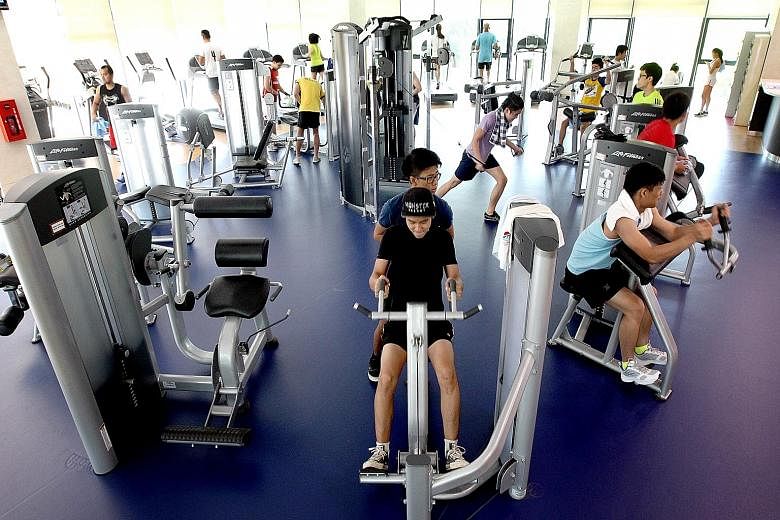Keeping your weight in check goes hand-in-hand with managing your calorie intake and output.
In essence, a calorie is a mathematical unit of energy - one kilocalorie (kcal) is the energy required to raise 1kg of water by 1 deg C.
But you will need more than academic knowledge to make the right lifestyle choices. Here are five things to know about calorie management, as explained by Dr Annie Ling, director of the obesity prevention management division at the Health Promotion Board (HPB).
The recommended daily calorie intake differs across age, activity level and gender.
On average, an adult man requires about 2,200 calories a day, while an adult woman needs about 1,800 calories. But if you work in the office, you may need fewer calories than a salesman who is often on the move.
Older people need fewer calories to maintain the same weight. This is because their metabolism and activity levels are lower. For this group, getting key nutrients like protein and calcium is more important in order to slow down the loss of lean body mass and bone mass.
-
Tips for cutting calories
• Budget your calories. If you have a big meal, eat fewer calories for your next meal.
• Cut calories without feeling hungry by swopping deep-fried dishes and items containing curry and gravy with lean protein, fruit, vegetables, whole grains and broth-based soups. The high fibre and water content will keep you feeling full for a longer time.
• Control your portions. It may help to use a smaller plate and to share desserts with friends. When eating out, ask for less sugar in your drinks. Instead of sweetened drinks, opt for plain or fruit-infused water.
• If you are patronising food outlets under the Healthier Dining Programme, you can choose lower-calorie options by looking out for dishes marked with the Healthier Choice Symbol.
• Integrate more physical activity in your daily routine. For instance, park farther away from the mall or home, and walk the extra distance. Take the stairs and walk to your lunch spot.
As for children and teenagers, counting calories is not advised as they are still growing.
Losing weight is not just about cutting down on calories or going on a crash diet.
Physical activity plays a vital role when it comes to losing weight safely - and keeping it off.
Besides burning calories, staying active promotes cardiovascular and bone health, while reducing your risk of diabetes.
Also, be patient. Lose the weight gradually - aim for 0.5kg to 1kg a week.
Extreme weight loss can negatively affect your energy level, mood and cognitive function. Plus, sticking to a low-calorie diet in the long term without medical supervision can lead to serious health problems like osteoporosis and kidney failure.
Not all calories are equal.
Every gram of fat contains 9kcal, while every gram of protein and carbohydrate provides 4kcal each.
Although carbs contain fewer calories than fat, the local diet is largely made up of refined carbohydrates, such as white rice, which are linked to a higher risk of Type 2 diabetes.
In addition, recent studies show that a moderate amount of fat is actually beneficial for health.
A guideline is to eat more "nutrient-dense" food - that is, food that contains plenty of vitamins and minerals, but relatively fewer calories.
Examples include fruit, vegetables, whole grains, lean protein like fish and healthier fats, such as nuts.
-
LIVE HEALTHY
Next weekend, learn how you can lead a healthier lifestyle at a roadshow by the Health Promotion Board. Highlights include sampling of healthy food and drinks, free BMI and eye screening, as well as mass workouts. You can also sign up for the National Steps Challenge, which encourages people to be more physically active by taking more steps daily.
Nov 7-8. Singapore Sports Hub and Kallang Wave Mall. 10am-9pm. Free. For more info, go to: www.healthylifestyle.sg
Some food and drinks may appear healthy, but boast an unexpectedly high amount of calories.
This is often due to the high sugar or fat content. A glass of fruit smoothie, for example, packs 325kcal. If you were to drink a glass daily on top of your regular diet, you may gain 9kg to 15kg in a year.
Cereal bars and ready-to-eat cereal, while often marketed as health foods, can be high in sugar and fat. A typical granola nut bar can have up to 250kcal per serving.
Lastly, nuts and nut-based butter are concentrated sources of calories - a handful of mixed nuts contains about 200kcal. It is wise to eat them in moderation.
Calorie trackers, like those on mobile apps, exercise machines and online nutrition tables, have a percentage of error.
The differences arise from the different ways in which food is prepared. If you wish to use a mobile app to track your calories, the Healthy 365 app by HPB has a calorie-intake feature based on localised data and includes local dishes.
So, the calorie count could be more accurate than overseas apps.
Poon Chian Hui

